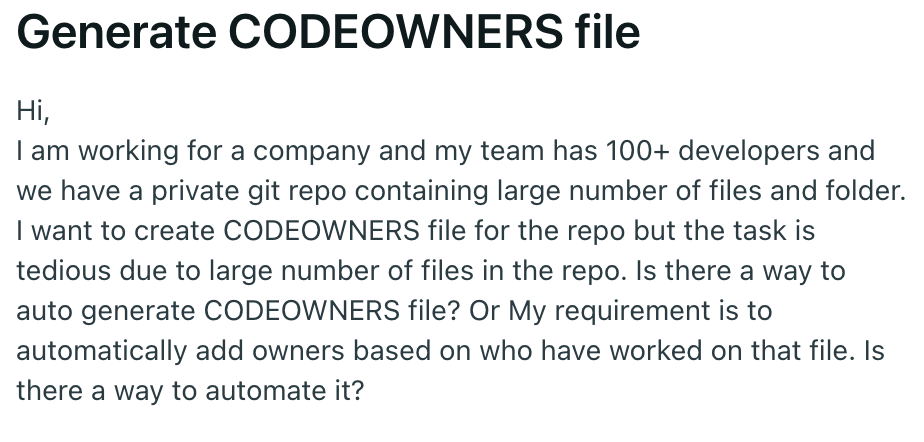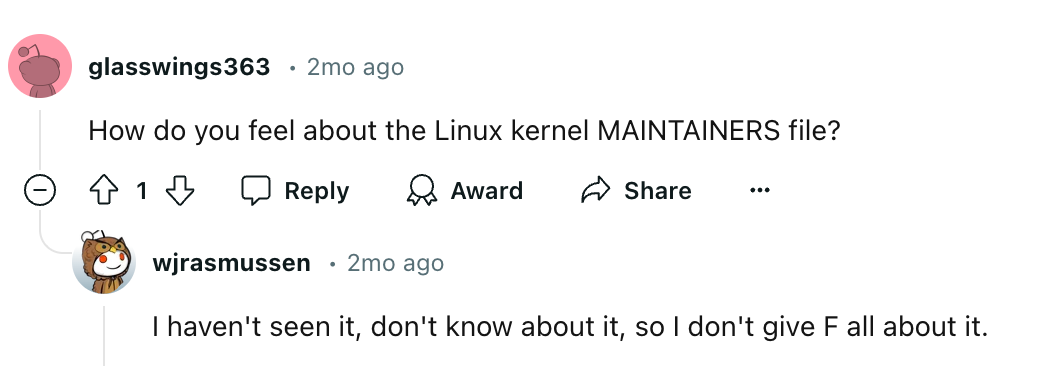
#pizza cli
The Problem of Knowledge Debt in Tech
BekahHW
5 mins read

A couple of weeks ago, I came across this Reddit post where a developer was trying to navigate a challenge that many of us in the tech community have also faced: managing code ownership in a large, complex codebase.
With over 100 developers and a massive repository, they were looking for a way to automate the creation of a CODEOWNERS file. Their hope? To automatically assign ownership based on who had worked on each file.
Not everyone in the comments was on board with this idea, calling out that this could be a recipe for disaster. You’re not wrong to be cautious, but let’s not dismiss the underlying need. The OP’s question points to a real issue in the tech industry: how do we manage knowledge and responsibility as the codebase and teams grow?
If you want to see a complex codebase, Kubernetes is a great example, with contributions from thousands of developers across hundreds of organizations. How do they manage it? They use an OWNERS file system that’s been tested and refined over the years.
The Kubernetes approach is about creating a map of expertise, facilitating code reviews, and making sure changes are reviewed by the right people. This system recognizes that in a project of that scale, no single person can know everything. The solution is to create a culture of shared responsibility and continuous learning.
Here’s the thing: what works for Kubernetes might not work for every team. And that’s okay. The key is to understand the principles behind the system and adapt them to work for your team.
When you implement solutions like automated CODEOWNERS generation, keep in mind to:
- Embrace shared ownership: The goal isn't to create territorial divides in your code. It's to identify who has the deepest knowledge in different areas, so they can guide and support others.
- Keep it dynamic: Your CODEOWNERS file should evolve as your team and codebase grow.
- Use it as a guide, not a rule: Code ownership shouldn't be a barrier to contribution. It's about facilitating knowledge sharing, not gatekeeping.
Ensuring that each part of the codebase has an expert responsible for its maintenance and review, effectively helps to manage the hidden debt of lost knowledge.
The Real Cost of Lost Knowledge
Let’s take a look at what knowledge debt costs us:
- Time: New team members spend weeks trying to understand systems that could be explained in hours by the right person.
- Efficiency: When you’re spending time figuring out what existing code does, or you don’t understand why the original developer made certain changes, you don’t have the time to spend on making meaningful progress.
- Morale: Nothing kills motivation faster than feeling lost.
- Inefficiency and Redundancy: You might spend days solving a problem that someone else on your team has already cracked. It's like reinventing the wheel, but the wheel is buried somewhere in your Git history, and you don't even know it exists. This isn't just a waste of time; it's a missed opportunity for collaboration and knowledge sharing.
- Maintenance Challenges and Siloed Knowledge: As knowledge gaps widen, the cost and complexity of maintaining older parts of the system increase. This can lead to knowledge silos, where only a few individuals understand critical systems, creating bottlenecks and reducing overall team capability.
Every time a developer writes a line of code without clear ownership, every time a key team member leaves without transferring their knowledge, the debt grows and the culture weakens. It compounds over time, making each new feature more costly, each bug more time-consuming to fix, each team interaction less effective. The debt of lost knowledge is often invisible, and we often don't realize it until we're in a crisis.
When the Debt Collectors Come Calling
Eventually, every debt comes due. In tech, this often comes during critical moments:
- A production outage caused by a change to a poorly understood component
- A missed market opportunity because adding a feature took months instead of weeks
- The departure of the last team member who understood a core system, leaving the project effectively "underwater"
These are the moments when companies often realize the real cost of their knowledge debt. But by then, it's often too late for an easy fix.
Enter the CODEOWNERS File: Your Knowledge Map
This is where tools like the CODEOWNERS file come into play. Think of it as a map of expertise for your codebase. But not just any map – a living, breathing document that evolves with your team.
At OpenSauced, we’ve taken this concept to the next level with our pizza-cli codeowners command. It's not just about assigning arbitrary owners to directories. This tool identifies who has the most relevant and recent expertise for each part of your codebase.
What sets it apart is its granularity and balance. It assigns up to three "owners" for each file or directory. Pair this with our pizza GitHub Action, and you've got a system that keeps your expertise map up-to-date automatically. You can learn more about how to get started in Introducing the Pizza CLI.
Generating your CODEOWNERS file using the pizza generate codeowners command automatically creates or updates a CODEOWNERS file, mapping files to the appropriate owners.
Beyond just managing debt, the codeowners command helps create a culture of responsibility and expertise. It makes code ownership visible and actionable, encouraging developers to take pride in their areas of responsibility and seek out opportunities to share their knowledge.
Final Thoughts
It's not hard to accumulate knowledge debt in the name of quick wins and feature delivery. But like any form of debt, ignoring it only makes the problem worse-not just for your codebase, but for your entire engineering culture.
By recognizing knowledge debt for the serious threat it is, and utilizing tools like the pizza cli to manage it, teams can ensure they're building on a solid foundation. They're not just writing code—they're cultivating a culture of ownership, expertise, and collaborative learning.
Remember, every line of code you write is a promise to your future self and your team. Make sure it's a promise you can keep by managing your knowledge debt and creating a culture of knowledge sharing today. The codeowners command is more than just a tool—it's a step towards a more sustainable and efficient development process, and a more collaborative engineering culture.

BekahHW
Bekah graduated from a coding bootcamp in May of 2019 and since then has spent time as a frontend developer, started the Virtual Coffee tech community, spent time in DevRel and has continued to mom her four kids. She currently co-hosts the Compressed.fm and Virtual Coffee podcasts, lifts heavy things in her free time, & works as the Developer Experience Lead at OpenSauced.
Recent Posts

bdougie
2 mins read
OpenSauced joins Linux Foundation, making AI-powered open source analytics freely available while expanding beyond GitHub to serve the broader open so...

#kubernetes
John McBride
5 mins read
How the OpenSauced engineering team made a near-zero downtime migration to Microsoft Azure



